 Opal
VS
Opal
VS
 Scholarly
Scholarly
Opal
Opal is a sophisticated AI-powered learning platform designed specifically for students, offering a comprehensive suite of study tools. The platform transforms various document formats including PDFs, text files, and audio recordings into interactive learning materials, powered by advanced language models GPT-3.5 and GPT-4.
The platform features AI-generated notes, customized flashcards, and intelligent quizzing capabilities that adapt to individual learning patterns. With multilingual support and bank-level security, Opal enables students to organize their study materials efficiently while maintaining data privacy and security.
Scholarly
Scholarly is an advanced learning platform designed to enhance the educational experience through artificial intelligence. It enables users to create comprehensive notes using a rich text editor that integrates text, images, flashcards, and equations. The platform also features AI-generated quizzes tailored to individual learning styles, offering various question types and immediate feedback to improve knowledge retention.
Beyond note-taking and quizzing, Scholarly functions as a powerful research assistant. Its AI capabilities allow it to perform web research, analyze sources, synthesize information, and generate detailed research papers complete with citations, charts, and images. Users can also interact directly with their PDF documents, asking questions and receiving AI-driven summaries or clarifications, streamlining the study and research process.
Pricing
Opal Pricing
Opal offers Freemium pricing with plans starting from $5 per month .
Scholarly Pricing
Scholarly offers Freemium pricing with plans starting from $8 per month .
Features
Opal
- AI-powered Notes: Automated extraction of key concepts and details from documents
- Interactive Flashcards: AI-generated cards for efficient review and understanding
- Active Recall System: Personalized quizzing with weakness identification
- Document Management: Support for PDF, TXT, MP3, WAV file formats
- Multilingual Support: Compatible with English, Spanish, German, French, Chinese
- Performance Tracking: Advanced analytics for monitoring study progress
- AI Assistant (Albert): Knowledge companion powered by advanced language models
- Semantic Search: Intelligent navigation through documents and folders
Scholarly
- AI-Generated Quizzes: Automatically transforms notes and study materials into interactive quizzes (multiple-choice, true/false, short answer, matching) with instant feedback.
- AI Research Assistant: Conducts web research, analyzes sources, synthesizes information, and generates research papers with citations, charts, and images.
- PDF Interaction: Allows users to chat directly with uploaded PDFs to ask questions, get summaries, and clarify content.
- Rich Text Editor: Combine text, images, flashcards, equations, and more in notes.
- AI Writing Assistant: Helps rewrite, expand text, and provides text completion.
- Flashcard Creation from PDF: Select text from PDFs to automatically create flashcards.
- Community Notes & Flashcards: Access and utilize study materials created by other users.
- Voice Interaction: Speak to the Scholarly assistant using natural language.
- Diagram & Graph Generation: Ask the AI assistant to create diagrams, charts, and mathematical graphs.
Use Cases
Opal Use Cases
- Creating study notes from lecture recordings
- Generating practice quizzes from course materials
- Organizing academic documents by courses and topics
- Building personalized flashcard decks
- Reviewing and summarizing academic papers
- Tracking learning progress across subjects
Scholarly Use Cases
- Creating interactive study quizzes from notes.
- Generating flashcards automatically from PDF documents.
- Conducting AI-assisted research for academic papers.
- Writing and organizing comprehensive study notes.
- Getting AI-powered assistance for writing tasks like rewriting or expanding text.
- Quickly understanding and summarizing PDF content.
- Collaborative learning by accessing shared notes and flashcards.
- Visualizing data through AI-generated charts and graphs.
FAQs
Opal FAQs
-
What is active recall?
Active recall is a study method where you actively try to remember information instead of just reading it over. Studies show it can boost long-term memory and understanding, with students improving their test scores by up to 50% compared to those who only reviewed their notes. -
What types of content does Opal work on?
Opal is able to analyze audio recordings and files, YouTube videos, and any documents of your choice. -
How does the AI work?
Opal currently runs on OpenAI's GPT-3.5 and GPT-4 large language models. -
How is my data handled?
OpenAI's secure API is used when your files are analyzed. All generated notes and information is held in our servers and cannot be accessed by anyone.
Scholarly FAQs
-
How does Scholarly help with research and writing?
Scholarly explores the internet to assist with research by automatically performing web searches and extracting key insights. It can generate research papers with charts, images, and properly formatted citations. -
How do AI-generated quizzes work?
Scholarly automatically converts your flashcards into various quiz formats like multiple-choice, true/false, and short-answer questions. The AI tailors quizzes to learning needs and provides immediate feedback, acting as a personal tutor. -
How do I create flashcards from PDF?
Upload your PDF, select the text you want to convert, and Scholarly will assist in creating flashcards from it. -
How can I chat with my PDFs?
After uploading a PDF, a chat window appears automatically. You can ask questions about the content, request summaries, or seek clarification on complex topics, and the AI will analyze the document to provide responses. -
Can I explore and use other students' notes and flashcards?
Yes, Scholarly allows you to explore and utilize notes and flashcards created by other students, providing access to diverse perspectives and information from a large community library.
Uptime Monitor
Uptime Monitor
Average Uptime
100%
Average Response Time
277.14 ms
Last 30 Days
Uptime Monitor
Average Uptime
100%
Average Response Time
402.9 ms
Last 30 Days
Opal
Scholarly
More Comparisons:
-
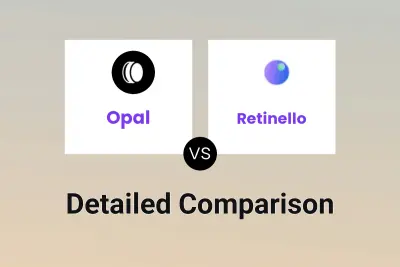
Opal vs Retinello Detailed comparison features, price
ComparisonView details → -
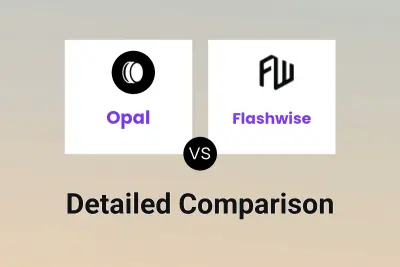
Opal vs Flashwise Detailed comparison features, price
ComparisonView details → -
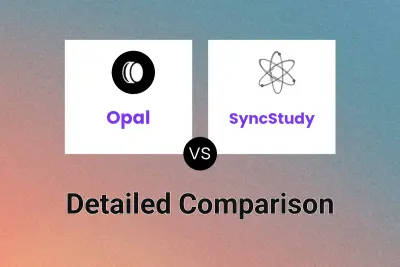
Opal vs SyncStudy Detailed comparison features, price
ComparisonView details → -

Opal vs Flashcard Generator Detailed comparison features, price
ComparisonView details → -
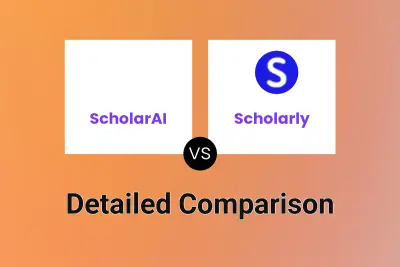
ScholarAI vs Scholarly Detailed comparison features, price
ComparisonView details → -

QuizCat vs Scholarly Detailed comparison features, price
ComparisonView details → -
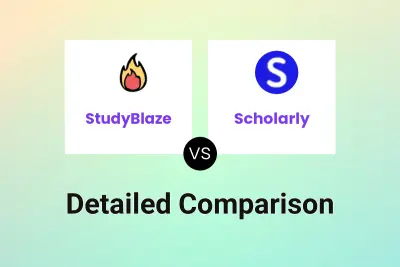
StudyBlaze vs Scholarly Detailed comparison features, price
ComparisonView details → -
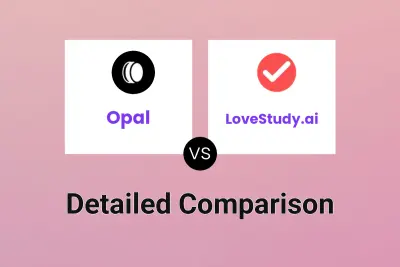
Opal vs LoveStudy.ai Detailed comparison features, price
ComparisonView details →
Didn't find tool you were looking for?